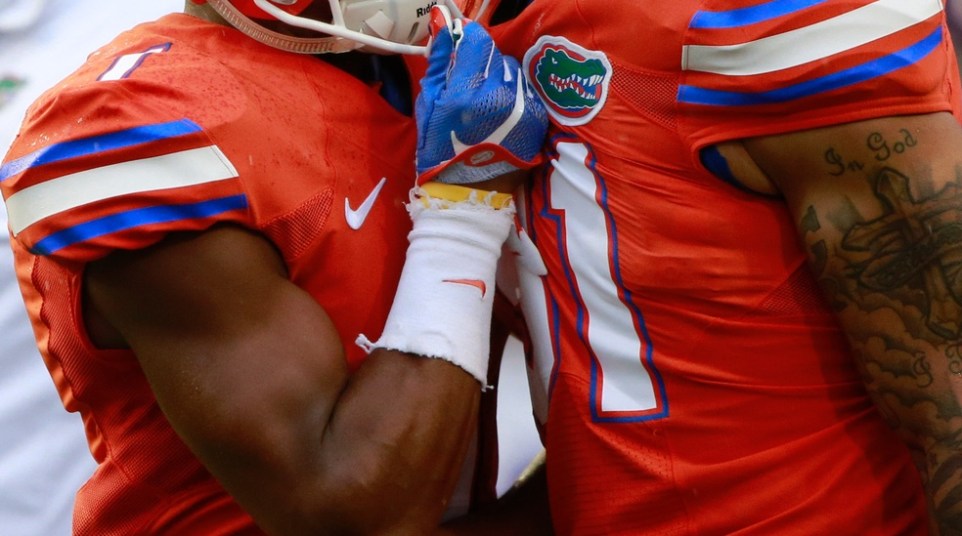
Riding the SEC Twitter wars and the social media dilemma
A decade ago, before social media became a cultural force, football fans could satisfy guilty pleasures online by going to semi-pro football websites and reading their message boards.
Invariably, opposing players would come on and post, promising victory, making excuses for defeats and making laughingly braggadocios claims concerning their own talent.
It spoke of why the players hadn’t made it to a higher level in the first place. Their less-than-professional trash-talking had left the field and come online.
But what was once looked upon as the delusional ramblings of the lowest classes of football is now flourishing in the SEC on social media.
And it’s here to stay.
It’s not just players jawing back and forth on Twitter about an upcoming game, as Florida cornerback Jalen Tabor (@_31Flavorz) has seemingly mastered.
Two days after the death of Muhammad Ali, Tabor took on the swagger of “The Greatest” while watching the NBA Finals and tweeting this gem about the play of the Cleveland Cavaliers to his teammate Quincy Wilson: “they ain’t tripping they just can’t hang, something like UT in the forth (sic) lol.”
In previous years, this was called bulletin board material. Joe Namath aside, such talk would draw battle lines and inspire opponents.
Today, it is so commonplace that when asked about the Twitter battles of his players with those from Tennessee, Florida head coach Jim McElwain seemed to think it was only a sign of the times.
“That’s how a lot of people communicate today,” he told reporters in a telephone press conference last month. “It’s the society we live in, so, you know, great.”
Before one demonizes McElwain for playing his fiddle as his city burns, consider the matter of freedom of speech.
And a program wishing to censor or monitor their players from commenting about their livelihood may not be living in the 21st century.
Two SEC programs shared their policies on social media with Saturday Down South last week: Mississippi State and Auburn.
While Bulldogs administrator Bill Martin insisted MSU did not have any “official” policy on their athletes’ social media usage, he did say he advises the Bulldogs to “1. After composing a Tweet, but before you hit send, ask yourself: ‘Would I be comfortable saying this in front of my parents.’ If the answer is no, don’t tweet it. 2. Take pride in who/what you represent. In addition to representing your family, you also represent Mississippi State University and your team.”
Auburn sent even more details via Ward Swift, the Tigers’ Chief Marketing Officer:
- Do not post any pictures suggesting illegal or unbecoming behaviors
- Do not accept friend invitations from anonymous individuals
- Activate your privacy settings to allow only your friends to see your profile
- Do not post any personal information (i.e. phone number, address)
- Do not post negative information about SASS, the Athletics Department, or Auburn University
- Do not post any information on the internet that is considered disrespectful, obscene, illegal or otherwise contributes negatively to the image of Auburn Athletics or Auburn University
- Displaying any information (positive or negative) about your fellow student-athletes on web communities or anywhere on the internet would violate confidentiality and is prohibited.
The problem is these policies still leave as much gray matter as they did before. A Mississippi State player promising victory against Ole Miss, for instance, would be something he’d be proud to say in front of his family.
It would also likely fire up the Rebels if said online.
And what is “displaying information (positive or negative) about your fellow student-athletes?” If a Tiger were to post a picture of a teammate studying in the library with the caption “Hitting the books before finals — Gonna get all A’s!,” is this not sharing information regarding their activities and whereabouts?
By this definition, everything an Auburn player said online could be construed as potentially offensive.
Twitter isn’t going away. People from here on out are going to try to share the information they wish on social media.
One could argue that McElwain’s seemingly carefree attitude towards his players’ use of Twitter could show he is in touch with the times. What prospective student wants to play for a coach that will censor him?
And the fact of the matter is, Florida seems to be winning the Twitter wars. Last year, prior to its trip to Gainesville, the University of Tennessee’s own Twitter account tweeted a prediction of victory against the Gators.
That was before Florida’s memorable 28-27 comeback victory.
When administrations get into Twitter battles, it’s hard to discipline students for the same actions. There will certainly be comments made by SEC athletes on social media that will ruffle feathers, be it over a boastful prediction of victory or, say, a political comment.
But is there that much of a difference if these statements are made in social media or to a reporter? Twitter and Facebook may have made bulletin board material more prevalent, but as a result it’s also less shocking.
As well as less articulate. Fourth, not “forth,” Mr. Tabor.
